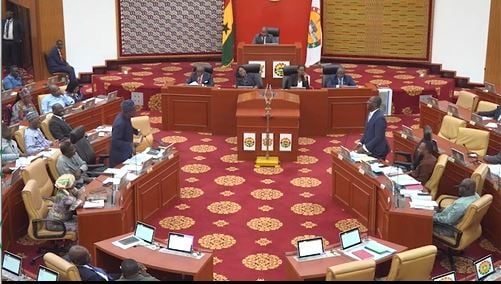The normally dignified chambers of Parliament devolved into a scene of chaotic disarray on Tuesday afternoon, triggered by a seemingly minor dispute over access to the dispatch box. The incident, which ultimately led to the abrupt suspension of proceedings, underscores the deepening rift and escalating tensions between the Majority and Minority factions, further impeding the legislative body’s ability to effectively conduct its business. This latest clash highlights the growing trend of procedural wrangling employed by both sides as a tactical maneuver, effectively paralyzing crucial parliamentary functions and obstructing the progress of legislative agendas.
The spark that ignited the inferno was Minority Leader Alexander Afenyo-Markin’s attempt to address the House from the dispatch box located on the Minority side. This seemingly routine action was met with immediate and vehement resistance from Majority Leader Mahama Ayariga, who declared in no uncertain terms that the Majority would not permit Afenyo-Markin’s use of the box under any circumstance. Ayariga’s objection transformed a procedural matter into a symbolic battleground, reflecting the broader power struggle between the two factions and the increasingly adversarial nature of their interactions. This seemingly trivial issue quickly escalated into a full-blown confrontation, paralyzing the legislative process and further damaging the already strained relationship between the Majority and Minority parties.
In an attempt to restore order and diffuse the escalating tensions, Minority Chief Whip Frank Annoh-Dompreh intervened, citing what he claimed was a previous ruling by First Deputy Speaker Bernard Ahiafor that granted Afenyo-Markin the right to use the dispatch box. Annoh-Dompreh appealed to Ahiafor to uphold his purported earlier decision, hoping to de-escalate the situation and return the focus to the business of the House. However, his efforts to mediate proved futile, as Ahiafor vehemently denied ever issuing such a ruling, further fueling the flames of discord and pushing the confrontation towards an impasse. This conflicting recollection of events added another layer of complexity to the already tense situation, making a peaceful resolution even more elusive.
The situation spiraled out of control when First Deputy Minority Whip Habib Iddrisu entered the fray, doubling down on Annoh-Dompreh’s assertion and insisting that Ahiafor had indeed made the ruling in question. This direct challenge to the Deputy Speaker’s authority further inflamed the already volatile atmosphere, turning the procedural dispute into a personal affront. Ahiafor, visibly angered by Iddrisu’s insistence, demanded evidence to support his claim, failing which he threatened to refer the Tolon MP to the Privileges Committee for making unsubstantiated statements in what he described as a “House of record.” This threat underscored the seriousness of the situation and the potential consequences for those deemed to have breached parliamentary decorum.
Despite the looming threat of disciplinary action, Iddrisu initially refused to back down, maintaining his position and reiterating his claim. This defiance only served to prolong the standoff and further entrench the opposing sides. The escalating tension and persistent disorder compelled Ahiafor to issue an ultimatum: retract the statement or face referral to the Privileges Committee. After a protracted period of heated exchanges, and under immense pressure from the Speaker’s chair, Iddrisu finally relented and withdrew his comment. However, this eleventh-hour concession proved too little, too late to salvage the proceedings. The damage had been done, and the atmosphere within the chamber remained thick with tension and animosity.
With parliamentary order irrevocably broken and the atmosphere poisoned by acrimony, First Deputy Speaker Ahiafor had no choice but to suspend the sitting at 3:22 p.m. This abrupt termination of proceedings underscored the depth of the dysfunction plaguing the House and the escalating inability of the Majority and Minority factions to engage in productive dialogue. The incident serves as a stark reminder of the urgent need for a fundamental shift in the dynamics between the two sides, a move toward greater cooperation and mutual respect. Failure to address the underlying issues driving this escalating conflict threatens to further erode the credibility and effectiveness of the Parliament, jeopardizing its crucial role in the democratic process.














